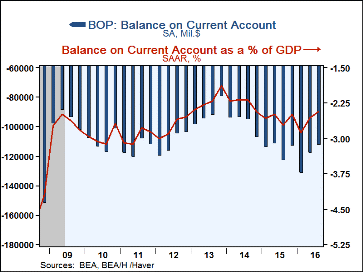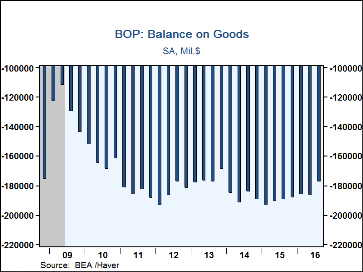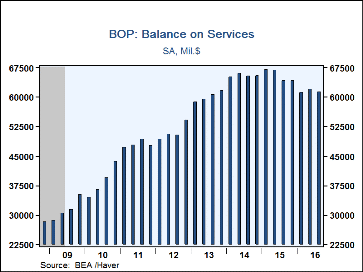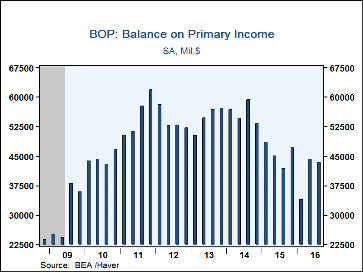 Global| Dec 15 2016
Global| Dec 15 2016U.S. Current Account Deficit Narrows Further
by:Tom Moeller
|in:Economy in Brief
Summary
The U.S. current account deficit eased to $113.0 during the third quarter from $118.3 in Q2, revised from -$119.9 billion. The Q3 deficit figure compared to $111.6 billion expected in the Action Economics Forecast Survey. The deficit [...]
The U.S. current account deficit eased to $113.0 during the third quarter from $118.3 in Q2, revised from -$119.9 billion. The Q3 deficit figure compared to $111.6 billion expected in the Action Economics Forecast Survey. The deficit has been trending sideways since early last year. As a percent of GDP, the deficit last quarter of 2.4% was less than half the size in mid-2007.
The narrowing in the deficit reflected a shallower $177.7 billion deficit on goods trade. A 4.4% rise in goods exports outpaced the 1.2% gain in goods imports. The surplus on services trade eased to $61.3 billion as a 2.2% rise in imports outpaced the 1.1% gain in exports. In the capital account, the surplus on primary income eased slightly to $43.4 billion while the secondary income deficit expanded to $39.9 billion.
The current account data can be found in Haver's USECON database. The expectations figure is in the AS1REPNA database.
| US Balance of Payments SA | Q3'16 | Q2'16 | Q1'16 | Y/Y | 2015 | 2014 | 2013 |
|---|---|---|---|---|---|---|---|
| Current Account Balance ($ Billion) | -113.0 | -118.3 | -131.8 | -123.1 | -463.0 | -392.1 | -366.4 |
| Deficit % of GDP | 2.4 | 2.6 | 2.9 | 2.7 | 2.6 | 2.3 | 2.2 |
| Balance on Goods ($ Billion) | -177.7 | -186.7 | -186.3 | -189.8 | -762.6 | -752.2 | -702.2 |
| Exports | 4.4% | 1.7% | -3.0% | -0.3% | -7.5% | 2.6% | 1.9% |
| Imports | 1.2% | 1.2% | -2.4% | -2.3% | -4.7% | 4.0% | -0.4% |
| Balance on Services ($ Billion) | 61.3 | 62.0 | 61.1 | 64.2 | 262.2 | 262.0 | 240.4 |
| Exports | 1.1% | 0.5% | -1.2% | -1.5% | 1.0% | 6.0% | 6.9% |
| Imports | 2.2% | 0.5% | 0.7% | 3.2% | 1.5% | 4.4% | 2.0% |
| Balance on Primary Income ($ Billion) | 43.4 | 44.2 | 34.0 | 41.8 | 182.4 | 224.0 | 219.0 |
| Balance on Secondary Income ($ Billion) | -39.9 | -37.7 | -40.6 | -39.3 | -145.0 | -125.9 | -123.5 |
Tom Moeller
AuthorMore in Author Profile »Prior to joining Haver Analytics in 2000, Mr. Moeller worked as the Economist at Chancellor Capital Management from 1985 to 1999. There, he developed comprehensive economic forecasts and interpreted economic data for equity and fixed income portfolio managers. Also at Chancellor, Mr. Moeller worked as an equity analyst and was responsible for researching and rating companies in the economically sensitive automobile and housing industries for investment in Chancellor’s equity portfolio. Prior to joining Chancellor, Mr. Moeller was an Economist at Citibank from 1979 to 1984. He also analyzed pricing behavior in the metals industry for the Council on Wage and Price Stability in Washington, D.C. In 1999, Mr. Moeller received the award for most accurate forecast from the Forecasters' Club of New York. From 1990 to 1992 he was President of the New York Association for Business Economists. Mr. Moeller earned an M.B.A. in Finance from Fordham University, where he graduated in 1987. He holds a Bachelor of Arts in Economics from George Washington University.
More Economy in Brief
 Global| Feb 05 2026
Global| Feb 05 2026Charts of the Week: Balanced Policy, Resilient Data and AI Narratives
by:Andrew Cates










